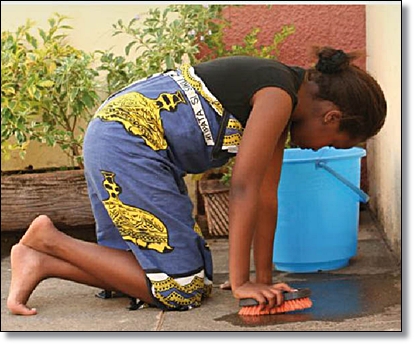
DISPUTES between domestic workers and employers over remuneration and poor working conditions are on the increase, as the country’s economic situation takes a downturn.
BY HAZVINEI MWANAKA
Zimbabwe Domestic Allied Workers’ Union (Zdawu) secretary general, Helarious Ruyi said most employers were failing to pay their domestic workers, resulting in an upsurge of disputes.
He said some employers were paying paltry wages, taking advantage of the desperation of domestic workers. Others are dismissed when they ask for better pay or working conditions.
Most of them do not know how or where to seek recourse, said Ruyi.
“Physical and emotional violence between domestic workers and their employers is increasing, though for the meantime, we do not have exact statistics due to some issues beyond our control, but from the reports we are receiving, the figure is on the rise,” said Ruyi. “Because of the high unemployment rate in the country, most women have resorted to domestic work to earn a living, and employers have taken advantage of this to exploit their workers.”
Wages for domestic workers are at US$100 per month for the highest paid grade which includes child minders, cooks and gardeners. According to the law, a gardener is supposed to be getting US$85 per month while a cook or housekeeper is entitled to US$90 per month.
However, most employers are paying far less than the recommended wage.
- Chamisa under fire over US$120K donation
- Mavhunga puts DeMbare into Chibuku quarterfinals
- Pension funds bet on Cabora Bassa oilfields
- Councils defy govt fire tender directive
Keep Reading
Ruyi said the union had started educational workshops to train domestic workers on their rights and other issues to ensure that they are not exploited. “We have done some workshops in Harare, Bulawayo, Masvingo and Kadoma to educate domestic workers on their rights, as well as to report to the union and the police,” he said.
Zimbabwe is still to ratify the Domestic Workers Convention 189 of the International Labour Organisation (ILO), to enable domestic workers to enjoy full international labour rights and protection.
“Domestic workers should just be respected like any other human being,” added Ruyi.
However, an employer from Harare’s Sunningdale suburb, Sophia Choto said domestic workers are difficult to please.
“They [maids] are difficult people. You do not know how they think. You treat them well, they act in the contrary. They are difficult to please. They steal from you, eat the baby’s food and in the process they abuse the confidence the mothers have in them, so the tension will never end,” she said.
A domestic worker from Warren Park in Harare, who only identified herself as Bridget, argued that employers treated them unfairly.
“Some mothers treat us like aliens, giving us food to eat away from everyone, while others give us food different from what everyone else is having. Some go to the extent of not allowing us to watch television with the rest of the family,” she said. “If they treat us fairly, we will respect them.”
Sarudzai Chinenge of Warren Park said both parties have a role to play to solve their disputes.
“Some mothers have become careless, they have now resorted to being remote mothers whose only concern is office work and busy schedules to the extent of relegating other chores such as washing their undergarments and their husband’s to maids. Real women of virtue and nobility, please stand up and reclaim the role and responsibility in the house,” said Chinenge. “To those maids, one does not have to be cruel, if they are not happy with their wages, they should discuss the issue or report it to the police rather than showing their cruelty to helpless, young, sweet and innocent babies.”
Most domestic workers accept low wages out of desperation.
Zimbabwe’s unemployment rate remains very high at more than 80%, with less than 900 000 people formally employed out of a 14 million population. An estimated 100 000 jobs have been since 2004.
ILO statistics indicate that there are 10,5 million children worldwide, most of them underage, who are working as domestic workers.











